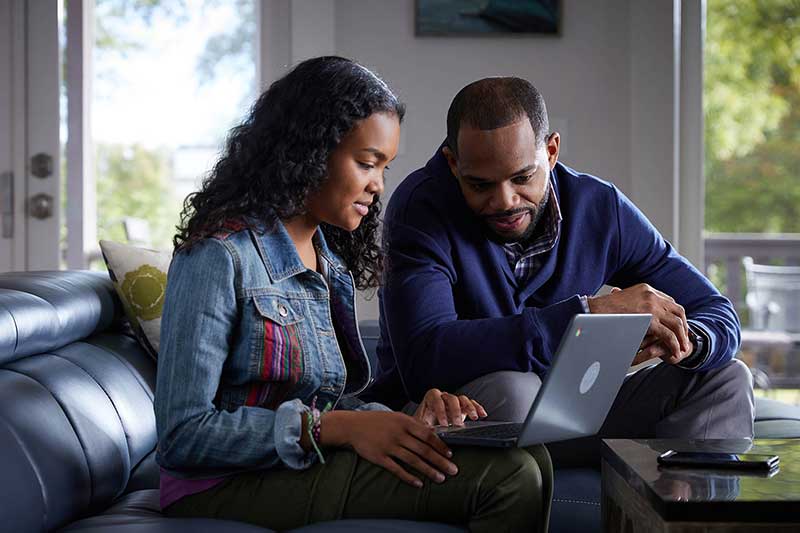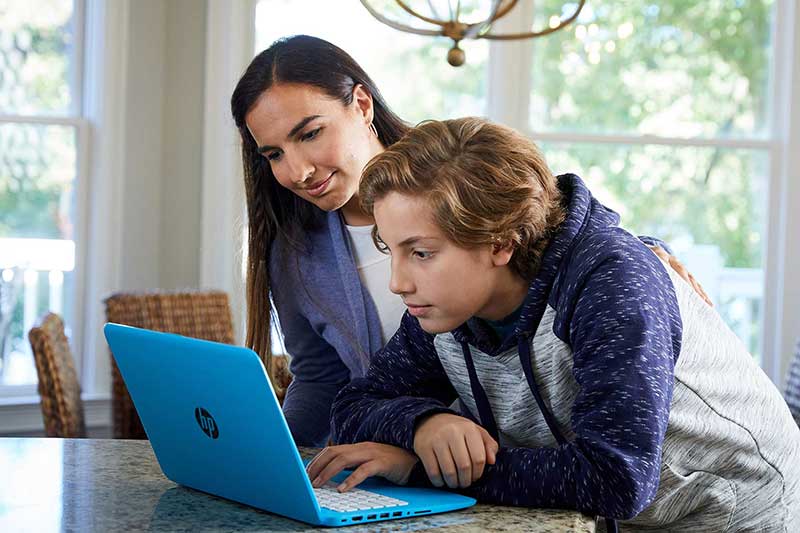Keeping Your Teen or Tween Safe Online
Technology can be a wonderful thing, but sometimes the benefits come at a cost. Social media, online gaming, chat rooms—you name it—the internet can expose children to some scary stuff, including bullying, inappropriate content, identity theft and online predators.
Keeping your teen safe online is critical, and we want to help take out some of the guesswork.
In this article:

Talking with your teen about being online
“As kids get older and begin getting mobile devices, they are more and more active online,” says Angie Boy, DrPH, program manager at the Stephanie V. Blank Center for Safe and Healthy Children. “Setting boundaries is important, but we’ve found the most effective way to protect against online dangers is having open conversations about what your teen may find online and making them comfortable telling you if they comes across something suspicious.”
Tips for having open conversations about being online:
- Ask your child what websites and apps they use. Ask your child what kinds of things they typically see and talk about online. The answers will continually change, so keep asking.
- Tell your child about the different things they may find on the internet. Let your child know that not everyone online can be trusted.
- Ask your child who they talk to online and if they know all of those people in real life.
- Let your child know they can always come to you if they find something questionable online. Let them know that a gut feeling is a good enough reason to share with a parent or a trusted adult.
- Share stories of how people have been lied to or mistreated online. Hearing about a news story or a friend’s experience may let your teen know it’s OK to open up.

Setting expectations for online activity
“Make sure your teen knows that being online is an earned privilege—not a right. Set expectations for the whole family,” says Boy. “Be honest and clear about what you consider appropriate online activity, and be specific about boundaries.”
Setting boundaries for your teen:
- Make sure they know that not everything they finds online is true and that people online are not always who they say they are.
- Know that kids are savvy, and your teen probably knows ways to hide his activity from you. Continue talking openly about being online so they know what you consider acceptable.
- Limit the time your teen spends on the internet. Determine the times it’s OK to be online. If necessary, you can download software to help you enforce the time limits.
- Discuss access and limits. This is trickier with older children as they become more independent. Use your best judgment.
- Install parental controls or monitoring software that doesn’t block access but may record activity or send a warning message if your child accesses inappropriate content. Be honest about what you’re doing upfront, and explain why you’re monitoring them (for their safety).
- Keep up with trendy teen internet behavior. For example, creating fake social media accounts to post on for their parents to see when they have another secret profile.
Kids find loopholes to get what they shouldn’t have. Teens purchase gift cards (that act like debit cards) to order e-cigarettes online, or they download an app that looks like a calculator but is really a secret hiding place for photos. The more you can inform yourself on what is really happening online, the better.

Cyberbullying
According to the National Crime Prevention Council, more than 40% of teens fall victim to cyberbullying, and only 11% of victims talk with a parent or trusted adult about the incident. Talking openly about cyberbullying can develop trust so your child is comfortable coming to you after an incident.
Tips for talking about cyberbullying:
- Ask your teen about how they feel when they're online. Does anything online make you sad, scared or angry? Does anything or anyone online make you feel bad about yourself? Are your friends nice to you online? Has anyone ever been mean to you online?
- If your teen does tell you about a cyberbullying incident, try to manage your reaction (and not overreact) so they trust they can go to you in the future. Get as many details as you can, and block or report the bully.
- Help your teen remember that real people with real feelings are behind profile pictures and usernames.
- Model polite, thoughtful and kind behavior in your own online activity. If your teen sees you treat people kindly and with respect, they're more likely to follow suit.

Being the “internet police”
The internet can be both a wonderful resource and a dark, dangerous place. “We don’t want to scare kids away from enjoying the benefits of online tools and communities. We just want them to think about how what they share and how they behave online can impact their safety and security,” says Boy. “The sad reality is that we live in a world where it can be dangerous to be too trusting of others. If you don’t know the person on the other end of the chat in real life, how could you possibly know they are who they say they are?”
It can be tricky to balance your child’s safety and privacy, but safety should be your main concern. “Have an open conversation with your child about monitoring their activity—especially with older children and teens. Let your child know you respect their privacy and independence but that their safety is your main concern,” says Children’s Healthcare of Atlanta Strong4Life licensed therapist, Jody Baumstein, LCSW.




